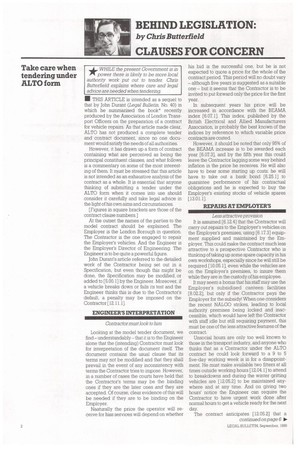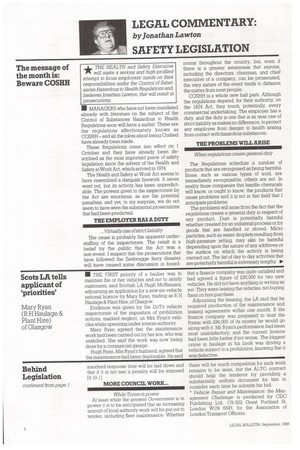BEHIND LEGISLATION:
Page 110

Page 114

If you've noticed an error in this article please click here to report it so we can fix it.
by Chris Butterfield
CLAUSES FOR CONCERN
Take care when tendering under ALTO form
WHILE the present Government is in " power there is likely to be more local authority work put out to tender. Chris Butterfield explains where care and legal advice are needed when tendering.
• THIS ARTICLE is intended as a sequel to that by John Durant (Legal Bulletin, No. 40) in which he summarised the book* recently prOduced by the Association of London Transport Officers on the preparation of a contract for vehicle repairs. As that article made clear, ALTO has not produced a complete tender and contract document, since no one document would satisfy the needs of all authorities.
However, it has drawn up a form of contract containing what are perceived as being the principal constituent clauses, and what follows is a commentary on some of the most interesting of them. It must be stressed that this article is not intended as an exhaustive analysis of the contract as a whole. It is essential that anyone thinking of submitting a tender under the ALTO form when it comes into use should consider it carefully and take legal advice in the light of his own aims and circumstances.
[Figures in square brackets are those of the contract clause numbers.] At the outset the names of the parties to the model contract should be explained. The Employer is the London Borough in question. The Contractor is the one engaged to repair the Employer's vehicles. And the Engineer is the Employer's Director of Engineering. The Engineer is to be quite a powerful figure.
John Durant's article referred to the detailed work of the Contractor being set out in a Specification, but even though this might be done, the Specification may be modified, or added to [5.00.1] by the Engineer. Moreover, if a vehicle breaks down or fails its test and the Engineer thinks this is due to the Contractor's default, a penalty may be imposed on the Contractor [12.11.1).
ENGINEER'S INTERPRETATION Contractor must look to him Looking at the model tender document, we findunderstandably that it is to the Engineer alone that the (intending) Contractor must look for interpretation of the document itself. The document contains the usual clause that its terms may not be modified and that they shall prevail in the event of any inconsistency with terms the Contractor tries to impose. However, in a number of cases the courts have held that the Contractor's terms may be the binding ones if they are the later ones and they are accepted. Of course, clear evidence of this will be needed If they are to be binding on the Employer.
Naaturally the price the operator will receive for hiss services will depend on whether his bid is the successful one, but he is not expected to quote a price for the whole of the contract period. This period will no doubt vary although five years is suggested as a suitable one but it seems that the Contractor is to be invited to put forward only the price for the first year.
In subsequent years his price will be increased in accordance with the BEAMA index [6.07.1]. This index, published by the British Electrical and Allied Manufacturers Association, is probably the best known of the indices by reference to which variable price contracts are costed.
However, it should be noted that only 95% of the BEAMA increase is to be awarded each year [6.07.3], and by the fifth year this could leave the Contractor lagging some way behind inflation in the price he receives. He will also have to bear some starting up costs: he will have to take out a bank bond [6.25.13 to guarantee performance of his contractual obligations and he is expected to buy the Employer's existing stocks of vehicle spares [13.01.1].
REPAIRS AT EMPLOYER'S Less attractive provision it is assumed [6.12.4] that the Contractor will carry out repairs to the Employer's vehicles on the Employer's premises, using [6.17.3) equipment supplied and maintained by the Employer. This could make the contract much less attractive to a prospective Contractor who is thinking of taking up some spare capacity in his own workshops, especially since he will still be required [10.05.1], even while the vehicles are on the Employer's premises, to insure them while they are in the custody of his employee.
It may seem a bonus that his staff may use the Employer's subsidised canteen facilities [8.02.2], but only if the Contractor pays the Employer for the subsidy! When one considers the recent NALGO strikes, leading to local authority premises being locked and inaccessible, which would have left the Contractor with staff idle but still requiring payment, this must be one of the less attractive features of the contract.
Unsocial hours are only too well known to those in the transport industry, and anyone who thinks that as a Contractor under the ALTO contract he could look forward to a 9 to 5 five-day working week is in for a disappointment. He must make available two fitters at all times outside working hours [12.04.1] to attend to breakdowns and during the winter gritting vehicles are [12.05.2] to be maintained anywhere and at any time. And on giving two hours' notice the Engineer can require the Contractor to have urgent work done after normal hours to get a vehicle ready for the next day.
The contract anticipates [12.05.2] that a continued on page 6 ■ LEGAL BULLET1N, September, [989
standard response time will be laid down and that if it is not met a penalty will be imposed [6.19. 1].
MORE COUNCIL WORK...
While Tories in power Al least while the present Government is in power it is to be anticipated that an increasing amount of local authority work will be put out to tender, including fleet maintenance. Whether there will be much competition for such Work remains to be seen, but the ALTO contract should help the tenderer by providing a substantially uniform document for him to consider each time he submits his bid.
* Vehicle Repair and Maintenance: the Management Challenge is produced by CDC Publishing Ltd, 178-202 Great Portland St, London WIN 6NH, for the Association of London Transport Officers.




















































































































